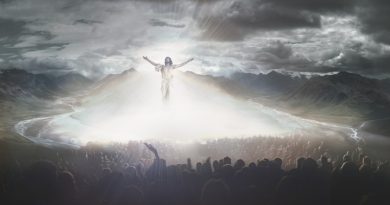‘You Will Be as Gods’: New Age Movement and Transhumanism
By Derek Gilbert
We’ve learned a bit about the original rebel: the entity called Chaos. And we’ve considered how this might also be connected to the Titans of old. Now, let’s dig a bit deeper into Prisoner Zero’s ultimate end.
The Chaoskampf left the original earth in a state of imperfection, the consequence of the real original sin. But even then, the Lord had determined the direction of His thoughts.
Regardless of the Dragon’s plans, He had always known the Rebel would rouse once more to defy Him. Remember, nothing surprises the Lord. Nothing at all. We can take comfort in that. We can rest upon Him in the same way a child might rest upon his father’s shoulder. We allow Him to make the decisions, for He knows best.
The Chaoskampf must have galled, confused, and amazed the first created beings, those elder brothers who sang together as morning stars in the days of creation! And God’s response to Prisoner Zero, for the swift and destructive actions of the Lord of Hosts (meaning “Yahweh of Armies”) to Chaos/Typhon/Leviathan, demonstrated to all the Divine Assembly members just what the dire consequences of rebellion would be—the wages of sin.
But it also revealed the Lord’s endless mercy; for Yahweh could have destroyed Chaos right away—with nothing more than a word. Instead, He chose to humble and constrain the ancient rebel dragon beneath the power of His Spirit until the time of the end. Then, all the elder brothers and all the humans from Adam forward will witness the final judgment of the first rebel, when Leviathan is finally punished for his rebellious deeds. And all who have practiced evil and rebelled against the Lord will earn their just reward in the Lake of Fire, after which:
Then I saw a new heaven and a new earth, for the first heaven and the first earth had passed away, and the sea was no more. (Revelation 21:1; emphasis added)
How comforting are these last words! The sea was no more! Oh, but for now, even as a prisoner, Chaos exerts an evil influence upon all creatures, both in our physical world and in the spirit realm. Prisoner Zero’s evil may have inspired the second rebellion, which occurred in a very special garden.

Did you know that Eden was the original holy mountain of God? Yes, Eden was a garden, but it was a garden set upon a mountain. We learn this from Ezekiel 28:
Son of man, say to the prince of Tyre,
Thus says the Lord God:
“Because your heart is proud,
and you have said, ‘I am a god,
I sit in the seat of the gods,
in the heart of the seas,’…
You were the signet of perfection,
full of wisdom and perfect in beauty.
You were in Eden, the garden of God;
every precious stone was your covering,
sardius, topaz, and diamond,
beryl, onyx, and jasper,
sapphire, emerald, and carbuncle;
and crafted in gold were your settings
and your engravings.
On the day that you were created
they were prepared.
You were an anointed guardian cherub.
I placed you; you were on the holy
mountain of God;
in the midst of the stones of fire you walked.
You were blameless in your ways
from the day you were created,
till unrighteousness was found in you.
In the abundance of your trade
you were filled with violence in your midst,
and you sinned;
so I cast you as a profane thing from
the mountain of God,
and I destroyed you, O guardian cherub,
from the midst of the stones of fire.” (Ezekiel 28:2, 12–16)
Eden was more than just a garden. More than a paradise. It was the where the divine council met, the “seat of the gods” on “the mountain of God.” Adam and Eve were there, and they served alongside the “elder brothers”—or elohim—as members of the Lord’s divine council.
Although Ezekiel 28:1–19 is addressed to the King of Tyre (probably Ithobaal III, who reigned in Ezekiel’s day, between 591 and 573 BC), most commentators agree that these passages are really aimed at the divine rebel in Eden. Some try to de-supernaturalize the section and apply the verses to Adam, but verses 17 through 19 describe punishments that cannot refer to Adam’s post-Garden life (“I exposed you before kings, to feast their eyes on you”—what kings does the writer mean?).
You might say that the Garden of Eden was the earth’s first temple, God’s dwelling place amongst humanity. Ezekiel 28 makes the point in its condemnation of the rebel in the Garden:

By the multitude of your iniquities,
in the unrighteousness of your trade
you profaned your sanctuaries. (Ezekiel 28:18a; emphasis added)
Now here, the word translated as “sanctuaries,” miqdash, is the same word used to describe the tabernacle built by Moses per God’s instructions. This verse, then, identifies Eden on God’s holy mountain as a sacred space, unique and set apart from all other places on earth; the place where Yahweh walked and talked with man. From the moment Adam and Eve disobeyed God’s command to refrain from eating the fruit of the tree of the knowledge of good and evil, human history has been the chronicle of His plan to redeem us—to bring humanity back to His mountain—and of the Enemy’s attempts to thwart that plan.
It was also in Eden that the Enemy first employed a PSYOP (psychological operation). And these PSYOPs have formed a major component in the enemy’s arsenal ever since. In this case: “You will be as gods.”
Many false religions (and false teachings within the Body of Christ) can be boiled down to that one insidious lie. And the Enemy keeps using it, because it keeps working. The apostles contended with this lie in the first century, and this PSYOP is still alive and well in the twenty-first. Doctrines from belief systems as diverse as speculative Freemasonry and the New Age movement are built around the idea that we are all divine and could return to that transhuman, übermensch state, if we’d just recognize and develop the spark within us.
Of course, that’s a bald-faced lie. Instead of achieving godhood, Adam and Eve lost their immortality, died spiritually, got kicked out of their home (the garden), were expelled from the divine council, and were evicted from the holy mountain.
All because they listened and believed a serpent’s lie.
Who is this enemy? Who is the serpent in the garden?
The name “Satan” means “accuser,” and it’s written ha-shaitan in the Old Testament. It is not a personal name, but a job title—“the satan.” Ha-shaitan means “the accuser” or “the adversary.” Think of it as performing the office of prosecuting attorney—the one who accuses the defendant of a crime.

Now the serpent was more crafty than any other beast of the field that the Lord God had made. (Genesis 3:1)
The word translated as “serpent” in this verse is nachash. It’s based on an adjective that means “bright” or “brazen,” like shiny brass. The noun nachash can mean “snake,” but it can also mean “one who practices divination.” In Hebrew, it’s not uncommon for an adjective to be converted into a noun—the term is “substantivized.” If that’s the case here, nachash could mean “shining one,” which is consistent with other descriptions of the Satan figure in the Old Testament.
For example, in Isaiah 14, the character is called “Lucifer” in the King James translation, based on the Latin words chosen by Jerome (lux + ferous, meaning “light bringer”). But the original Hebrew text actually names him—not “Light Bringer”—but Helel ben Shachar, which means “shining one, son of dawn.” Interestingly, Shachar was the name of a Canaanite deity: Shachar (“Dawn”), twin brother of Shalim (“Dusk”).
Now, consider this in Daniel 10:
I lifted up my eyes and looked, and behold, a man clothed in linen, with a belt of fine gold from Uphaz around his waist. His body was like beryl, his face like the appearance of lightning, his eyes like flaming torches, his arms and legs like the gleam of burnished bronze, and the sound of his words like the sound of a multitude. (Daniel 10:5–6; emphasis added)
Obviously, “shining one” is an apt description of the angel who had to battle the prince of Persia—another supernatural being—to bring his message to Daniel.
Another example occurred about nine hundred years before Daniel, when the Israelites began to complain (and complain and complain) on their way out of Egypt. In response, God sent saraph nachash (“fiery serpents”) to torment them. Saraph is the root word of seraphim, which roughly means “burning ones.” The Hebrew words saraph and nachash are used interchangeably, so rather than “fiery serpents,” the actual translation should read “saraph serpents.”
Deuteronomy 8:15 praises Yahweh for bringing Israel through “the great and terrifying wilderness, with its fiery serpents,” reinforcing the interchangeability of saraph and nachash.
Now, if the mental image of flaming snakes isn’t weird enough, the prophet Isaiah twice referred to flying serpents (saraph `uwph, in Isaiah 14:29 and 30:6). And in his famous throne-room vision, Isaiah saw:

…the Lord sitting upon a throne, high and lifted up; and the train of his robe filled the temple. Above him stood the seraphim. Each had six wings: with two he covered his face, and with two he covered his feet, and with two he flew. (Isaiah 6:1–2)
Again, the root word of “seraphim” is saraph, the same word translated “serpent” in Numbers and Deuteronomy. In fact, aside from the Isaiah 6 passage above, every single mention of “seraphim” in the Old Testament refers to serpentine beings!
Throughout the ancient Near East, the flying serpent was a well-known symbol, especially in Egypt. Therefore, it would have been very familiar to the Israelites. The uraeus, a cobra standing on its coiled body with its hood extended, was a royal symbol of protection used by pharaohs and Nubian kings. Tutankhamun’s death mask is an excellent example; and interestingly, the uraeus’ hood is depicted with six distinct sections that look a lot like six wings.
The bottom line is this: What Adam and Eve saw in the garden wasn’t a talking snake, but a nachash—a radiant, divine entity, very likely of serpentine appearance.
But consider also that a good, one-word English term to describe a flying, fiery serpent is “dragon.”

Derek P. Gilbert hosts Five in Ten, a daily analysis of the news for SkyWatchTV, and co-hosts the weekly programs The Bible’s Greatest Mysteries and Unraveling Revelation with his wife, author, and analyst Sharon K. Gilbert. Derek is a Christian, a husband and father, and the author of the groundbreaking books Bad Moon Rising, an analysis of the spiritual forces behind Islam, The Great Inception, and Last Clash of the Titans. He’s also the co-author with Sharon K. Gilbert of Giants, Gods & Dragons, a new take on end-times prophecy that names the Four Horsemen of the Apocalypse, and Veneration, a deep study on the ancient cult of the Rephaim. Derek has also co-authored The Day the Earth Stands Still with Josh Peck, which documents the occult origins of “ancient aliens.” Derek’s new book is The Second Coming of Saturn, which exposes the many faces of the Roman god Saturn and his role during the end times. Find out more at www.derekgilbert.com, www.gilberthouse.org, or www.SkyWatchTV.com.



